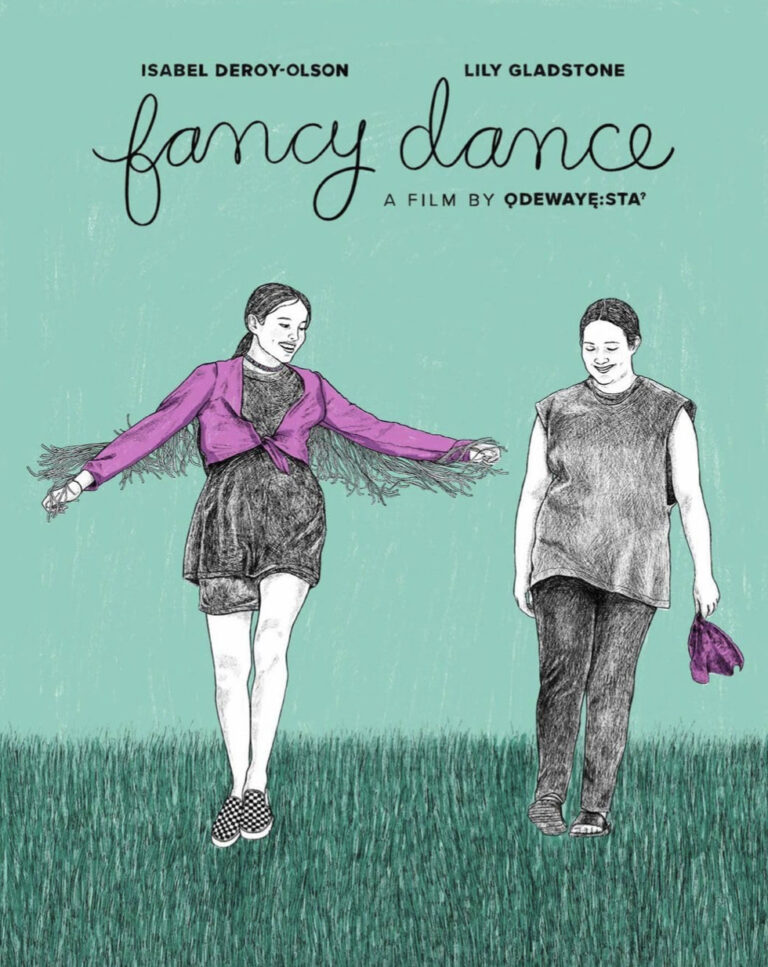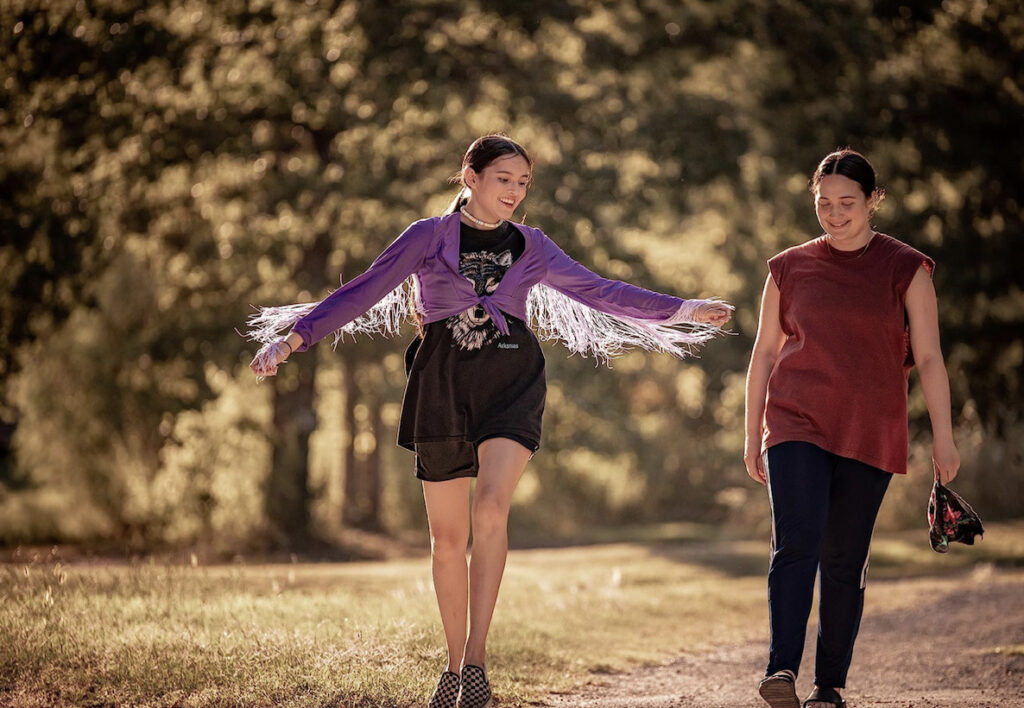
Communities often have a harrowing way of showing its concern and support for other drastically different cultures, no matter how much they claim to be humanitarians. The new Native-centric drama Fancy Dance powerfully highlights that moral injustice. The film focuses on a family in the Seneca-Cayuga tribe that’s devastated by the indifference towards their plight by the world beyond the reservation.
Erica Tremblay and Miciana Alisa wrote the movie’s screenplay together. Tremblay, who is a Seneca–Cayuga American documentarian, made her narrative feature film directorial debut on Fancy Dance.
The filmmaker also rose to prominence in the narrative space by scribing and helming episodes of the critically acclaimed teen comedy-drama television series, Reservation Dogs. It’s the first show to feature all Indigenous writers and directors. As a result, the crew was able to share their personal struggles on screen through the characters. The first season was filmed entirely in Oklahoma, which makes it the television series to do so.
Like Reservation Dogs, Fancy Dance shows the struggles and despair of reservation life for Indigenous people, especially women. With an unsolved disappearance of one of the women on Oklahoma’s Seneca-Cayuga reservation, the movie is an intense character study that showcases how tribal members navigate a desperate, but all-too-common, situation. They often have to take matters into their own hands because the outside world doesn’t care enough to work with the community to find and help these missing and endangered women.
Set in northeastern Oklahoma’s Indian Country, Fancy Dance follows Jax (Lily Gladstone), a Seneca-Cayuga Native American woman who’s trying desperately to hold her family together. Months after her sister Tawi’s (Hauli Gray) disappearance, Jax’s good-natured, impressionable 13-year-old niece, Roki (Isabel Deroy-Olson) holds out hope that her mother will return home. The teen is hoping that she’ll be able to dance with her mother again in the upcoming state powwow, like they did in recent years.
However, Jax is a bit more realistic about the low odds of her sister’s safe return home to their reservation. But she’s still determined to find out why Tawi disappeared and what ultimately happened to her.
When the state authorities and FBI make their indifference about her sister’s case apparent, Jax takes matters into her own hands. The police only seem interested in removing Roki from Jax’s care, due to the latter’s criminal record. After the teen is placed with her estranged white grandparents, Jax kidnaps her niece.
Together the duo sets out on the road in search of answers, which triggers an Amber Alert. As a result, a series of events are set into motion that will change both of their lives forever.
As a first-time feature filmmaker, Tremblay thrived by reflecting on her own experiences living in the Seneca-Cayuga Nation to craft an extremely personal, realistic and socially conscious drama. The film offers an authentic depiction of the enduring hardships her tribe experiences in modern times, particularly the indifference to their plight from the world beyond the reservation.
Fancy Dance offers a rare personal glimpse into Native culture, as almost every scene offers insights into a world that audiences seldom see. Jax was penned by Tremblay and Alise, and brought to the screen by Gladstone, to revel in joyfully resisting a society whose every system doesn’t respect her and her family’s way of life.
The hustles Jax nonchalantly engages in to survive, such as pilfering gas, food and other supplies while on the road, reflect the retaliation she takes against society. She feels there’s no harm in seeking retribution for the generations of mistreatment that has been committed against her family and reservation.
Gladstone once again proves to be one of the most complex, sophisticated and resilient breakthrough performers of 2023, after also garnering attention for starring in Killers of the Flower Moon. Much like her character of Mollie Kyle in Martin Scorsese’s epic Western crime drama, the actress’ character of Jax in Fancy Dance can force her way to overcome any obstacle.
Jax is trying to keep her family together and maintain the little piece of legacy they have left in their Seneca–Cayuga community, including the powwow. Gladstone translates Tremblay’s examination into what life is like on a reservation in the script onto the screen with ease. Jax is just one Native woman who endlessly struggling in poverty, a fractured justice system, broken homes and drugs and alcohol abuse.
Life is so bleak on some of the reservations that tradition is all some of the residents have to keep them connected to their culture. As they continuously miss and search for Tawi, Jax and Roki are also desperate to get to the powwow, in an effort to feel as though they’re still connected.

Gladstone’s determined nature to uncover the truth behind what happened to her sister is also captured on screen by the movie’s cinematographer Carolina Costa. The director of photography gives the story a film noir sensibility, as she chronicles Jax navigating through the literal and figurative shadows on and off the reservation.
The protagonist is shown to be in stealth mode to protect herself from anyone who may have harmed her sister. Jax also hides, skillfully in plain sight, to emphasize that she wants to evade the police as they search for her after she kidnaps her niece to go to the powwow.
After Reservation Dogs was shot in Oklahoma, Tremblay shot Fancy Dance in the Cherokee Nation. Already familiar with showcasing the landscape on screen, the filmmaker smartly choose not to entirely focus on emphasizing beauty shots.
Instead, she worked with Costa and the drama’s production designer, Charlotte Royer to setting Jax and Roki in their lived-in environment. While there are occasional establishing shots of clear streams and prairie grasses, most scenes are set in the locations that the protagonist and her niece routinely visit in order to survive. Those places, from tract homes to mini-malls and gas stations, highlight the impoverished imprisonment Jax, Roki and their neighbors are stuck in, as they endure an ongoing cycle of struggle and dislocation.
As Roki tries to contend with her mother’s disappearance, both on the reservation and on the road, Deroy-Olson’s performance rivals Gladstone’s emphasis on Jax’s determination to find her sister. Deroy-Olson showcases how her young character quickly comes-of-age as she realizes how the devastating effects of living on the reservation negatively impacted her mother.
Deroy-Olson’s connection to Roki represents how the current generation of young people must learn to understand the gravity of their situation. But she’s still hopeful that she can build a stronger connection with her culture.
Deroy-Olson also highlights that Roki is aware that her aunt is deceitful and antagonistic at times, and that her hostility towards the outside world is actually meant to protect her and her family. The teen character also realizes that she’s not innocent either, as follows her aunt’s guidance in order to receive the validation she’s missing from her mother and aunt place in her. Roki clings to her connection with Jax because she isn’t sure that the world beyond the reservation will treat her with similar love and protection.
Tremblay and Alise’s keenly observant script powerfully contends with a disconcertingly complex array of social issues, from endemic poverty to racism, foster care, and drug and alcohol abuse in Native communities. Those issues are captivatingly woven together through the crisis of missing and murdered indigenous women and girls, and the American government’s reluctance to help find them, which serves as Fancy Dance‘s thematic throughline.
Handled with candor and grace, these issues are emotionally integrated into the film’s narrative and dialogue, which is both in English and the Cayuga language, but they’re not melodramatically manipulative. Gladstone and Deroy-Olson’s emotional performances and natural bond are stunningly captured by Costa’s cinematography and set against Royer’s production design of Jax and Roki’s lived-in environment.
Overall, the movie showcase how Jax and Roki set out to find their rightful place in their culture, free of expectations and the pitfalls that often plague the indigenous women on their reservation. While Jax and Roki are determined to find satisfaction during their time of conflict, they also remain aware about the upcoming challenges that they still face, which makes the drama both satisfying and realistic.
Fancy Dance screened in the Made in USA category at the 32nd Philadelphia Film Festival on October 24.
Grade: A-

